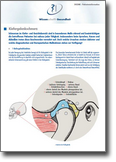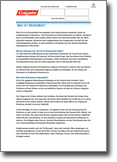Temporomandibular joint pain
Temporomandibular joint pain can have many different causes. The temporomandibular joints are the most mobile joints of a human being and must withstand a chewing pressure of 160 kg. This means that they are very stressed in the course of a lifetime. The movements of the temporomandibular joint when chewing and speaking are very demanding and can be severely disturbed by an inaccurate bite position of the teeth or a worn denture. This can lead to incorrect loading and pain in the temporomandibular joint. Symptoms
|
|
In order to be able to detect a malposition in the jaw area, an examination by a dentist is essential. This can determine the causes of pain in the jaw. If a jaw misalignment is detected during an examination, different diseases may have occurred.
- Tension of the masticatory and facial muscles
- Chronic neck, back or joint pain
- Maxillary misalignments
- Sounds in the ear
- Indigestions
Therapy
Depending on which diagnosis your dentist makes, there are different therapy options. If worn or incorrectly inserted dentures are responsible, they must be repaired. However, if other causes such as teeth grinding (bruxism), malocclusion or mental tension are to blame, your dentist will treat you differently depending on the cause.
A few things such as muscle exercises, autogenic training and yoga can be done yourself to relieve blockages in the muscles, but these measures do not replace going to the specialist.
further information about temporomandibular joint pain
 |
 |
||||
